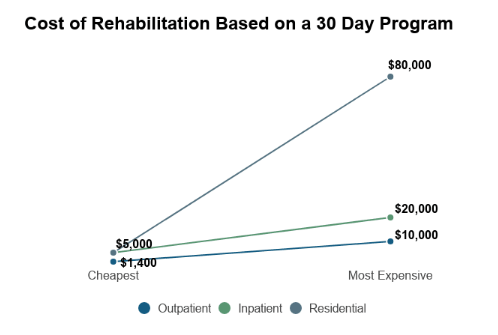Drawing from my wealth of knowledge, I can say you can do outpatient rehab by yourself, but it is not recommended. Having support and accountability is important in recovery.
While outpatient treatment allows you to continue living at home, it is best to have the support of family, friends, or a sponsor to help keep you on track.
In this blog, we are going to give you a detailed tour of the perks of doing outpatient alcohol rehab all by yourself, what you need to know, and whatnot.
Potential Benefits of Attempting Outpatient Rehab Alone
If you have a problem with drinking too much alcohol, you may be wondering if you can do rehab yourself from alcohol.
Outpatient rehab is a type of care that lets you stay at home while you get counseling, medicine, and support.
Most of my teenage patients ask for outpatient guidance. Inpatient rehab requires you to stay in a center for a certain amount of time. Outpatient rehab, on the other hand, gives you more freedom and flexibility.
Lower Cost Than Inpatient Rehab
One of the main advantages of outpatient rehab as self rehab from alcohol is that it is usually cheaper than inpatient rehab/ residential rehab.
Inpatient rehab can cost thousands of dollars per month, depending on the facility, treatment, amenities, and the duration of the program.
Outpatient rehab, on the other hand, can cost much less, within a maximum of $10K for a 30-day program, depending on the type and frequency of services you receive. You may also be able to use your health insurance or other financial assistance to cover some or all of the costs.
While verifying my knowledge, I’ve found that surveys mentioned the same concept.
Source: NCDAS

Stay In Familiar Surroundings
Another good thing about outpatient or self rehab from alcohol is that you can stay in your own home or surroundings instead of moving to a new place you don’t know.
That can help you feel better and less worried while you are getting better. You can also keep your privacy and escape the shame that may come with going to a rehab center.
With first hand experience, I saw patients struggling for a long time just to adapt to the new environment. My patient Thomas still thanks me for creating a familiar support network for him in his time of need, which eventually led to an improved lifestyle and better performance in academics.
I created proper guidance for him, combining his rehab treatments and home practices to avoid the trigger and stay sober. He was an introverted guy, and adjusting to inpatient rehab would be impossible for him.
He thinks that it would be impossible for him if I wasn’t guiding him at that time.
Maintain Your Daily Routine
Outpatient rehab also lets you keep doing things like work, school, family, or hobbies that you normally do. You don’t have to stick to a strict routine set by a facility.
Instead, you can plan your treatment sessions around your schedule and needs. That can help you find a good balance between your goals for recovery and your other responsibilities and hobbies.
But don’t put your facts in the middle that trigger your addiction. Then, no treatment plan will help you out.
Minimal Disruption To Work or Responsibilities
In the same way as the last point, outpatient rehab can make it easier for you to keep up with your work or other responsibilities while you are away from home. You can still work and make money to support yourself or those who depend on you while getting care.
You can also avoid things like losing your job, missing deadlines, and getting behind on your work.
Recently famous actor Jussie Smollett, who entered Hollywood at a young age completed his 5-month outpatient rehab successfully. It’s confirmed by many verified online channels.
Source: TMZ

He came to the limelight in 2019 for violence. He was even in jail and fined. Several incidents of his addiction made him realize that he needed rehab.
So, he entered an outpatient rehab and continued his improvement by staying at home. And completed his treatment on February last, 2024.
Increased Sense of Personal Empowerment
Lastly, outpatient rehab can help you feel more in charge of yourself and in charge of your healing process. You don’t have to follow someone else’s plan for treatment. Instead, you can choose the type and amount of treatment that fits your needs and interests.
You can also be in charge of your own actions and choices instead of relying on rules or supervision from the outside.
That can help you gain self-confidence, independence, and a sense that you are good at what you do.
Challenges of Outpatient Alcohol Rehab by Yourself
As an expert in this field, I want to mention outpatient alcohol rehab is a type of treatment that lets you get over your addiction to booze while still living at home and doing your regular things.
But this isn’t right for everyone as I observed, and it has some big problems that can make it hard to succeed.
I dealt with my Patient Rafayat. Who was motivated toward her outpatient treatment. But the fact was she wasn’t able to concentrate toward staying sober as her parents were alcoholic too. So, she relapsed within a week.
So, I personally suggested that she join inpatient rehab. But after that we weren’t in contact. And I don’t know how she is now.
Limited Support And Supervision
One benefit of inpatient alcohol rehab is that you always have access to trained staff, counselors, doctors, and peers who can help you, check on your progress, and step in if you have a relapse or a crisis. 40% – 60% of addicts will relapse within one year.
In outpatient alcohol rehab, you are mostly on your own, and your family, friends, or other sources may not be able to help you enough. That can make you feel alone, cut off, and overpowered by the process of getting better.
For my patients, I faced issues while dealing with them in outpatient rehab. As I could support them when they visited the rehab. But it was impossible for me to support them in their home.
And most of the families didn’t know how to deal with an addict to prevent relapse. So, a number of my patients didn’t complete their treatment successfully only because of the lack of support at home.
Presence of Alcohol And Triggers at Home
Another problem with outpatient alcohol rehab from my point of view is that you have to stay in the same place where you started drinking and kept drinking. That means you might have easy access to booze, and be tempted to drink different things again.
My patient Thomas was doing good and completed outpatient rehab successfully. But in the middle of the treatment, one day he had alcohol in the fridge and saw ads for alcohol on TV, which made him want to drink.
Without the right skills and plans, it can be hard to avoid these causes. But I managed to tell him that it wasn’t appropriate and added some changes to the plan. That worked great.
Lack of Accountability for Attending Sessions
In outpatient alcohol rehab, I prefer to meet with a therapist, a counselor, or a group daily near you. You need these meetings to help you learn new skills, deal with deeper problems, and get feedback and direction.
But if you go to rehab on your own, you might not have anyone to make sure you show up to these classes. You can skip, be late, or not pay attention.
This can change how you feel, how you work, and what you end up with.
Challenges of Staying Committed Without Encouragement
Outpatient alcohol rehab also requires you to be committed to your recovery and follow a treatment plan that may include medication, therapy, education, and lifestyle changes.
However, if you are doing this rehab by yourself, you may not have anyone to encourage you, praise you, or celebrate your achievements.
You may feel discouraged, frustrated, or hopeless if you face setbacks or difficulties. You may also lose sight of your goals and reasons for quitting alcohol.
Continuing Stressors And Responsibilities at Home
With this rehab, you can keep living your normal life while getting help. But this can be hard if you have stressors and tasks at home that make it hard for you to get better.
For example, you might have to take care of your family, work, go to school, or pay your bills while trying to stop drinking.
These expectations can be overwhelming and distracting, and it can also bring up negative feelings and behaviors that can lead to relapse as far as I observed in my patients.
Absence of Community And Shared Experiences
When you go to outpatient alcohol rehab, you might not be around others who are going through the same thing. You might not be able to talk to others who are getting over alcoholism and share your experiences, problems, and achievements.
You might also miss out on the benefits of peer support, like feeling understood, getting help, and being inspired. Having a sense of community and connection can be very important for staying sober and taking care of your health.
As you can see, outpatient alcohol rehab alone is difficult and fraught with risks. I advise you to seek professional guidance near you or online and examine other methods that offer more support, structure, safety, and efficacy. Know if Americans can attend rehab in Canada.
- What to Pack for 30-Day Rehab? FREE Checklist - May 30, 2024
- Types of Outpatient Rehab: Difference One Should Know - March 28, 2024
- Truth Behind FMLA: Hidden Hurdles of Alcohol Rehab Leave - March 28, 2024